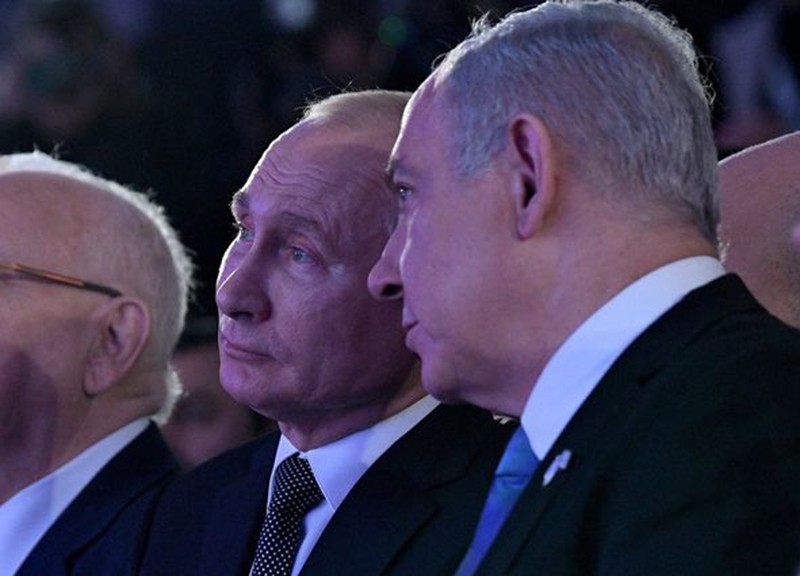
Chaos in Gaza spells relief for Moscow as U.S. focus shifts from Ukraine to supplying Israel
By Alan Cullison and Thomas Grove - WSJ
For years, Israeli Prime Minister Benjamin Netanyahu pursued what he called a com- plex relationship with the Kremlin, maintaining cordial relations with an increasingly isolated Russian President Vladimir Putin.
Even Russia's invasion of Ukraine and its warming relations with Israel's archrival, Iran, failed to upend the cooperation. The leaders kept in touch by phone, and Netanyahu announced a nonaligned approach to the war in Ukraine, refusing to purvey lethal aid or air-defense systems to Kyiv, despite Western pressure.
Today, after the deadly attack by Iranian-backed Hamas militants on Israel, the conversations appear to have ceased. Putin is one of the few major world leaders who hasn't called Netanyahu to offer condolences for the more than 1,300 Israclis killed by Hamas in the attack.
"Putin and Netanyahu used to communicate frequently," said Vera Michlin, a former of ficial at Israel's national-security council and now director of education at Sympodium, a U.K.-based think tank. "The current silence is definitely indicative of the wider Russian approach."
The ending of entente between Russia and Israel high-lights a larger tectonic shift under way in Russia's role in the Middle East since Putin launched his war in Ukraine.
Scrambling for arms and allies to execute its botched invasion of Ukraine, Russia has transformed its once carefully balanced relationship with Iran while strengthening ties with Arab states such as Egypt, Iraq and the United Arab Emirates.
Moscow is now seen as laying the foundation for a strategic relationship with the Islamic Republic, which supplied thousands of suicide Shahed drones that Moscow used since the invasion of Ukraine to degrade and destroy its neigh bor's power infrastructure and is now providing components for Moscow to Putin assemble the drones inside Russia. Russia, in turn, has de- livered Yak-130 training aircraft to Iran's air force and is considering a deal to sell Iran Su-35 jet fighters, which could Ours." shift the balance of air power in the Middle East. For years, Russia and Iran fostered ties with one another, but relations were sown with distrust because each side also toyed with better relations with the West. Now both sides are pariahs to the West and backed into the same corner, analysts say. "Russia is looking for a partner who can provide arms, but its embrace of Iran is driven also by a broader anti-Western sentiment," said Nikolai Kozhanov, an expert on Russian-Iranian relations at Qatar University.
The embrace has extended to Iran-sponsored Hamas, which carried out the massacre on Israeli civilians. During the past year, at least two high-level delegations have flown to Moscow for talks.
Russia hasn't denounced the attack by Hamas. Andrei Guruley, State Duma deputy and member of its Defense Committee, noted the effectiveness of Hamas in overcoming Israeli defenses and wrote on his Telegram channel that Russian forces could learn from their methods and the Israeli response.
"Whose ally is Israel? The United States of America," Mr. Gurulev wrote. "Whose ally is Iran and its surrounding Muslim world ?
Moscow's closer ties with Iran, as well as its efforts to build stronger ties with is rael's Arab neighbors, in many ways are a reprise of the Soviet Union's Cold War stance toward Israel. At the time, the Soviet Union's desire to upend U.S. partners and maintain footholds in the world's poorer economies led it to arm Israel's biggest enemies, leading to the Six Day War in 1967 and the Yom Kippur War six years later.
Russia supports a Palestinian state based on Israel's 1967 border with a capital in East Jerusalem.
The Kremlin, meanwhile, has domestic reasons to welcome a war farther from Russia's borders. With Russian presidential elections slated for March, the Kremlin has been looking for a diversion from the war in Ukraine. Putin has often sustained his 23-year-rule over Russia using state-run media to ignore domestic problems while focusing on disarray abroad.
That has been a tougher act to follow with the military debacles in Ukraine, which the Kremlin had planned as a short military operation but has drawn out into a long war.
Since the weekend, Russia's war in Ukraine has been forced off the front pages of newspapers inside and outside Russia, where state-run media have pivoted from the war in Ukraine to Israel and Gaza.
Top Russian officials signal they see other benefits in the months ahead, calling the out-break of fighting a blow to U.S. prestige, and that Washington must now reassess just how much it can continue to supply Ukraine to fight off Russian troops while it also supplies Israel.
Putin, in his first comments on the Hamas attacks earlier this week, lashed out at the U.S., calling them a "clear example of the failure of United States policy in the Middle East," which has never defended the interests of Palestinians in peace talks.
-Matthew Luxmoore














